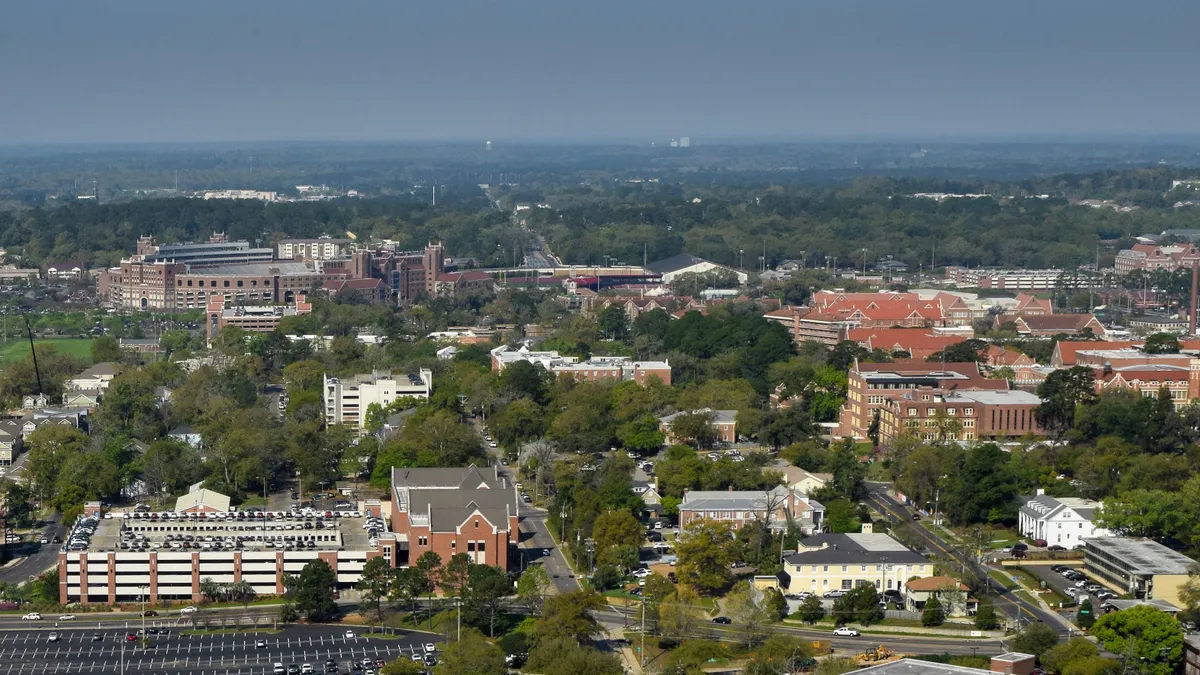Dive Brief:
- The U.S. Department of Justice is suing Illinois over state laws allowing certain undocumented college students to pay in-state tuition rates at public colleges and receive state-administered scholarships.
- Under Illinois law, an undocumented student is eligible for in-state tuition if they attended a high school in the state for at least three years, graduated from high school or earned a GED in Illinois, and sign an affidavit saying they will apply to become a permanent U.S. resident as soon as possible.
- U.S. Attorney General Pamela Bondi on Tuesday argued that in-state tuition rates for undocumented students illegally provide benefits not offered to all U.S. citizens. A spokesperson for Illinois Gov. JB Pritzker's office defended the policy on Wednesday, saying it is consistent with federal law.
Dive Insight:
As of May, Illinois was one of at least 25 states that, along with Washington, D.C., had policies making undocumented students eligible to pay in-state rates at some or all public colleges.
Over 27,600 undocumented students attended Illinois colleges in 2023, according to the Higher Ed Immigration Portal.
Illinois has had its in-state tuition policy for eligible undocumented students in place since 2003. And in 2011, the state General Assembly established the Illinois DREAM Fund Commission, which raises private donations to fund scholarships for those students.
Since June, the DOJ has sued at least five states, including Illinois, over the practice.
The same day the DOJ filed a lawsuit against Texas, the state attorney general's office partnered with the department to ask the court to strike down the policy. A federal judge declared it unconstitutional shortly afterward, though civil rights groups are seeking to intervene and challenge the ruling.
In Oklahoma, the state attorney general similarly worked with the DOJ to end its policy, a request approved by a federal judge on Friday. Florida repealed its policy through legislation this year independent of federal intervention.
“This Department of Justice has already filed multiple lawsuits to prevent U.S. students from being treated like second-class citizens — Illinois now joins the list of states where we are relentlessly fighting to vindicate federal law," Bondi said in a Tuesday statement.
Steven Weinhoeft, U.S. attorney for the Southern District of Illinois, similarly alleged that Illinois' law unlawfully disadvantages the state's citizens and uses tax funding to incentivize illegal immigration.
“Illinois has an apparent desire to win a ‘race to the bottom’ as the country’s leading sanctuary state," he said in a statement. "Illinois citizens deserve better."
Sanctuary jurisdictions, such as cities and states, are generally considered areas with policies limiting local authorities' cooperation with federal immigration enforcement efforts. Bondi has promised to "eradicate" such policies across the country.
Weinhoeft in February took over as the district's attorney for Rachelle Aud Crowe, following Trump's promise to fire all U.S. attorneys appointed by former President Joe Biden.
Unlike Texas and Oklahoma, Illinois is a solidly blue state, with Democratic control over the governor's mansion and both chambers of the Legislature. And Pritzker has been one of the most outspoken opponents of President Donald Trump.
A spokesperson for the governor's office called the lawsuit "yet another blatant attempt to strip Illinoisans of resources and opportunities."
"While the Trump Administration strips away federal resources from all Americans, Illinois provides consistent and inclusive educational pathways for all students — including immigrants and first-generation students — to access support and contribute to our state," the spokesperson said in an email Wednesday. "All Illinoisans deserve a fair shot to obtain an education, and our programs and policies are consistent with federal laws."
The DOJ's lawsuit names as defendants:
- The state of Illinois.
- Pritzker.
- Illinois Attorney General Kwame Raoul.
- Southern Illinois University's board of trustees.
- Rend Lake College's board of trustees.
- The University of Illinois' board of trustees.
- Chicago State University's board of trustees.
- Eastern Illinois University's board of trustees.
- Illinois State University's board of trustees.
- Northeastern Illinois University's board of trustees.
- Illinois Student Assistance Commission.
- Illinois DREAM Fund Commission.
The University of Illinois system said Wednesday it is reviewing the complaint and had no comment. Chicago State said it does not comment on pending litigation. And Rend Lake declined to comment on the lawsuit, citing ongoing talks with its legal counsel.
The remaining colleges did not immediately respond to requests for comment Wednesday.
The difference between in-state and out-of-state tuition can be substantial.
In-state students who enrolled full time at Illinois State in fall 2025 paid $12,066 for a year of tuition. For out-of-state students, the cost was $24,132.
At Chicago State, new in-state students paid $352 per credit hour, while incoming out-of-state students paid $697.












